The Symbolic Banquets of the Bembas

Zambia is a country of diverse cultures that have successfully existed side by side in harmony. Credit must go to all the political leaders who have continued the “One Zambia, One Nation” policy initiated by Dr Kenneth Kaunda (the first Zambian President) after independence.
In the 1930s, copper was discovered on the Copper Belt. This provided great employment opportunities for people from all 72 tribes in Northern Rhodesia (as Zambia was then called). People from surrounding countries, Western and Eastern cultures also came.
In the early days, parents were hesitant, or even strongly opposed to the idea of their child marrying into a different culture. With time, intermarriages become more common place.
The marriage traditions that have been practised have tended to be influenced by a number of factors. Some people, growing up in an urban environment, have not fully understood the meaning or interpretation of their own ceremonies. Some have skipped and changed on account of financial constraints. Others have had to adjust their traditions as a way of 'compromising with a partner from a completely different culture.
The Bemba tradition recognizes four symbolic banquets in relation to courtship and marriage. These are
• Icisumina Nsalamu (Acceptance of marriage proposal),
• Icilanga Mulilo [Literal meaning: “The Showing of the Fire” or “Introduction to Cuisine” – Editor]
• Ukukonkola (Granting authority) and
• Amatebeto (Thanks offering),
It is not uncommon to find a bride’s family preparing Icilanga Mulilo for the groom, in the mistaken belief that it is Amatebeto. Others may prepare Icisumina Nsalamu believing it to be Icilanga Mulilo. Some have knowingly practiced a pick and mix version out of convenience. This fuzziness has been tolerated in many cases, but only adds to the confusion around these issues.
According to Mr. Dyson Chalwe, a traditional marriage counselor and long standing Shibukombe (a trustworthy person who is appointed to be the emissary and confidant for the groom in meeting the bride’s parents), there are four very distinct ceremonial banquets involving the taking of symbolic meals from the bride to the groom in the period leading to marriage and after commencement of marriage:
1. ICISUMINA NSALAMU (Acceptance of marriage proposal).
Icisumina Nsalamu is a meal prepared by the bride’s family, which they deliver to the groom, to symbolize the acceptance of his marriage proposal.
According to Mr.Chalwe, the meal only consists of one plate of Nshima (the traditional thick porridge made from maize meal) and a plate of whole chicken. The groom does not have to give back anything in return. The object of this gesture is for the bride’s family to show that they have accepted the marriage proposal on behalf of their daughter. It’s less elaborate than the other three banquets.
2. ICILANGA MULILO (Permission granting the groom freedom to have meals from the bride’s family during courtship visits).
[Literal meaning: “The Showing of the Fire” or “Introduction to Cuisine” – Editor]
Mr. Chalwe says that Icilanga Mulilo is food that is prepared by the bride’s family and delivered to the groom to symbolize an open invitation to the groom to dine with the bride’s family on future visits during their courtship. Traditionally, the groom is forbidden from eating any food at the bride’s parents or guardian’s home before this symbolic gesture. Different types of dishes are prepared by the bride’s to showcase their traditional cuisine.
The groom is expected to eat or taste every food, including the food that he is not familiar with.
The bride’s party prepare the meals at the house of one of their relatives. A big group of women then load the food parcels on their heads amid singing and drumming. They head to the house where the groom and his party are waiting. The bride is not involved in this.
When the party arrives at the gate at the grooms location, they pause and wait for an invitation to enter. This is in the form of money that the groom’s family drop on the ground in front of them. In a light hearted display, the party may refuse to enter until more money is offered. The amounts of money involved are not large, only symbolic.
Once the invitation to enter is accepted, the singing party then proceed to the house. At the door, they will turn around and enter the house walking backwards, with their parcels still balanced on their heads.
Once in the house, the singing and ululation continues. The women dance in the middle of the room. The party waits for an invitation to set down their food parcels. Once more, this takes the form of money offerings from the groom’s family.
Finally there is more dancing and singing. Those who are gathered then tuck into the feast.
This occasion, other than being a” showcase” of the bride's menu, also symbolizes that the groom is responsible for the welfare of his bride from then on. He can now assume the responsibilities of taking care of his bride’s financial needs. The bride at this stage is also allowed to start cooking and doing laundry for the groom.
Mr. Chalwe further revealed that after the Icilanga Mulilo ceremony, the groom is allowed to give back something, usually money, as a token of appreciation for the meal when delivering back the empty plates to the bride.

3. AMATEBETO (Thanks offering)
Amatebeto are prepared by the bride’s family and delivered to the groom after marriage has taken place. Amatebeto can be prepared two or more years into the marriage.
Amatebeto symbolizes the appreciation of the groom by the bride’s parents for keeping a trouble free marriage. It is an acknowledgement by the bridge’s family that the groom is capable of looking after his wife well and that they have re-affirmed their blessing of the marriage
In today’s practice, Amatebeto and Icilanga Mulilo have been used interchangeably. They are also the two ceremonies most easily confused for each other.
4. UKUKONKOLA (Granting authority)
Ukukonkola is a meal that is prepared for the groom by the bride’s parents. It is a meal that the groom eats at his in-law's house.
On this day, the meal symbolizes the authority that is given to the groom to make family decisions affecting his wife’s side of the family on behalf of elders in the bride’s family. The groom is allowed to make some decisions “without consulting” his in-laws. The bride’s family also declare their commitment to respect such decisions and to consider them binding.
The groom is initiated by first going to his father and mother in-law’s bedroom. Traditionally, teenagers and adult children are not allowed to enter their parents’ bedroom, much less an in law’s! The parents’ bedroom is traditionally regarded as a sacred place for a son in law to enter.
On this very special occasion, the son in law is allowed access. He is expected to remove the beddings found on his in-law’s bed and to get whatever valuables are exposed. He also has got to peep under the bed and to take anything that he finds there.
Thereafter he is led to the living room where he has to remove all the cushions on the sofa and reveal anything hidden underneath them. He is allowed to keep whatever he discovers.
He is then led into the kitchen where he is to open all the pots and pans, and eat whatever he finds. He is not expected to leave any left-overs. He is to get all the food that remains and take it to his home after this initiation.
The meal symbolizes that the groom has become part of the family and is now regarded as one of their own children. The groom is even authorized to personally tender a sick mother in law after this symbolic gesture.
According to Mr. Chalwe, this is the last in the process, of all symbolic banquets for a groom from his in-laws. The ceremonies are practiced to varying extents among Zambians of Bemba extraction. If you are marrying into the Bemba tribe, you now know what to expect.
There are numerous Zambian traditional ceremonies that are still practiced. KitweOnline is keen to hear your story if you have taken part or have knowledge of any traditional practices. Get in touch with us below.
SHARE YOUR THOUGHTS HERE
_________________________________________
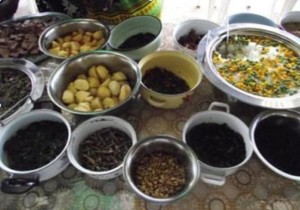
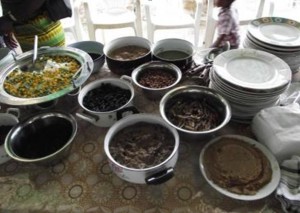
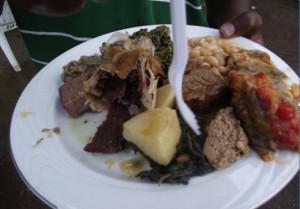
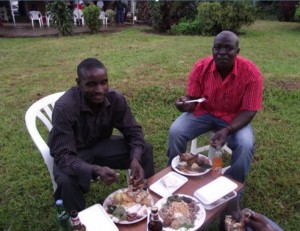

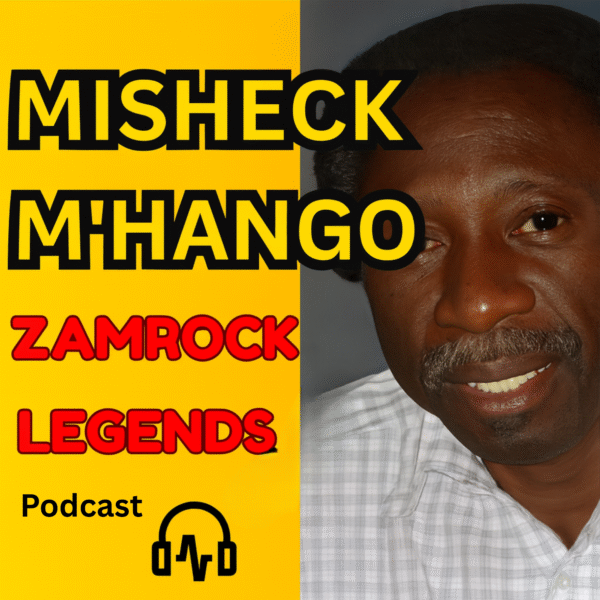
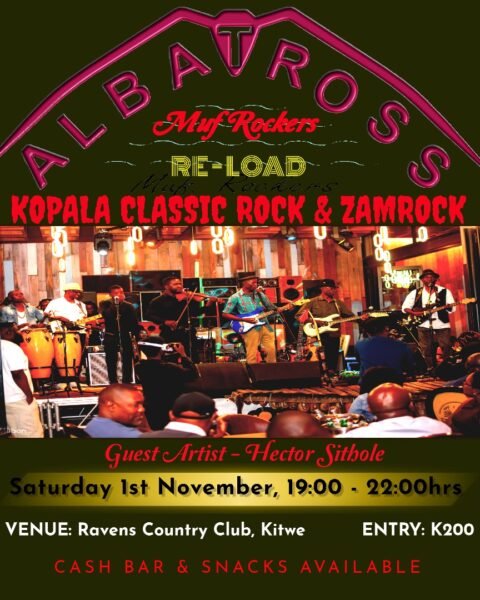
[…] Zambian Marriage Traditions – Kitwe On Line | Kitwe, Zambia … – The Symbolic Banquets of the Bembas . Zambia is a country of diverse cultures that have successfully existed side by side in harmony. Credit must go to all the political leaders who have continued the “One Zambia, One Nation” policy initiated by Dr Kenneth Kaunda (the first Zambian President … […]
[…] Nsalamu, a symbolic Zambian celebration of the Bemba tribe. Thanks to the ‘one Zambia, one Nation’ policy kept alive through previous […]
Very educative article. Looking forward to more.
I recognize talent I elevate sound by synthesis
……NSALAMU
I’am getting mixed up here. Reading through carefully I think it should be the other way round. What has been written on Icilanga Mulilo should be for Amatebeto and Amatebeto – Icilanga mulilo.
The difference is that Icilanga mulilo there are no drums and the food is in smaller portions. Its not meant for a large crowd only the family of the groom and the women who take are also few and they do that silently.
Amatebeto on the other hand is a glamorous event with beats dancing and ululating through out because here they are showing their gratitude to the groom for being such a good husband to their daughter and also to the family at large.
Our source of Information,Mr Dyson Chalwe maintains that our version is correct. The symbolic interpretation is not on where drums are played or not played.The meanings and differences are in what the meals represent.
Drums shouldn’t be beaten during icilanga mulilo. It’s a taboo to dance before the bridegroom who hasn’t even eaten your food and married your daughter. It’s shameful and disgusting to see the groom dancing in the presence of his mother in law during kitchen parties. Tabalakulula and the groom behaves as if he has been married for years.
I will be marrying a bemba girl and I need. More information on engagement and other traditional rites am Tonga by tribe
VIVA MOTHER ZAMBIA, Tubalange… very rich culture
This is a wonderful read. Do keep it up. Could you also add downloadable pdf’s. That’d be great.
I concur with you Eddie. This is very educative and needs to be in pdf for offline reads. Keep it up to the authors.
Ukukonkola comes under the Ukwingisha ceremony usually after or alongside Amatebeto i.e. appreciating a man or woman who has stayed and looked after the family (wife/husband, children including extended families remarkably well during the course of marriage)
[…] Article below discusses the consequences of late marriage for ladies. In Zambian tradition, marriage is regarded as one of the most sacred union in all the tribes of the 10 provinces. Thus, […]
Hi, great read and information. The Kitwe online site has been a really great language, cultural and ceremonial resource. Thank you.
I’m Australian and marrying a beautiful Zambian woman very soon.
I was hoping someone would know what a suitable, traditional or customary gift would normally be given to the Shibukombe?
Thanks for the help.
Why do they walk backwards as they enter with the food on the heads?
Great read!